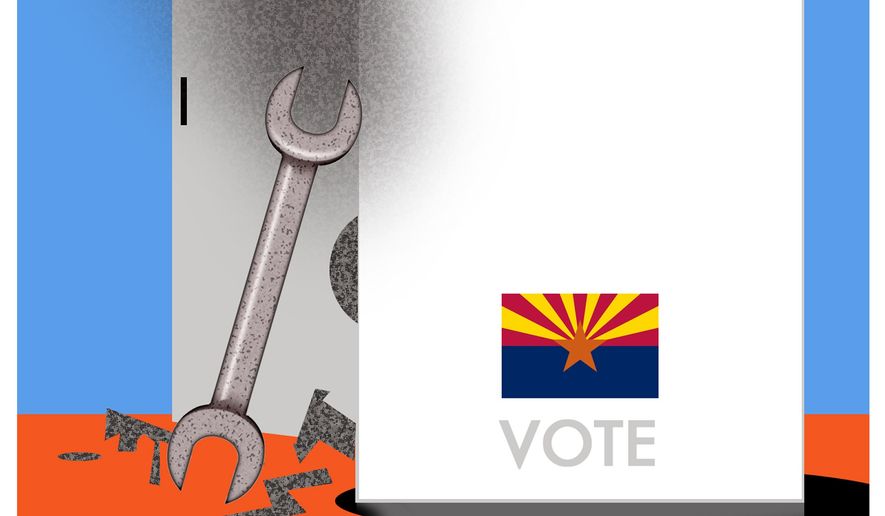OPINION:
If Arizona is genuinely interested in enacting much-needed state election reforms — and it should be, especially after this month’s voting debacle in Maricopa County, the state’s largest county — it’s now or never. Or at least for the next four or eight years.
Term-limited outgoing Republican Arizona Gov. Doug Ducey should call a lame-duck special session of the Legislature for the sole purpose of enacting voting reforms before the presumptive governor-elect, Democrat Katie Hobbs, can take office on Jan. 2 — after which it definitely won’t get done.
(Ms. Hobbs leads her Republican opponent, Kari Lake, by 0.6 of 1%, or 17,150 votes, out of more than 2.55 million counted. The race has been called by the news media in the Democrat’s favor, but Ms. Lake has yet to concede.)
“The way they run elections in Maricopa County is worse than in banana republics around this world,” Ms. Lake was quoted as saying by London’s Daily Mail newspaper, adding: “I believe at the end of the day that this will be turned around.”
The Daily Mail reported that Arizona Assistant Attorney General Jennifer Wright on Nov. 19 wrote to one of Maricopa County’s top election officials that “detailing reports of a string of irregularities from printer problems that stopped ballots being tabulated, to confusion about procedures for transferring voters to alternate sites if they were unable to vote at the first location.”
Ms. Wright’s letter added, “These complaints go beyond pure speculation, but include firsthand witness accounts that raise concerns regarding Maricopa’s lawful compliance with Arizona election law.”
All of this comes on the heels of a Nov. 7 report in The Epoch Times that “19,000 late, invalid ballots were counted” in Maricopa County in the 2020 election.
Arizona Senate Majority Leader Rick Gray and House Speaker Russell Bowers, both Republicans, should press Mr. Ducey on the need for a special session. So should GOP members of the state’s congressional delegation, Reps. Andy Biggs, Paul Gosar, Debbie Lesko and David Schweikert.
Gov. Ron DeSantis of Florida — where there were none of the problems Arizona experienced, despite having an electorate three times the size of Arizona’s — could provide the Grand Canyon State with model election-reform legislative language to adapt for its needs.
Any election-reform legislative package should include some combination of the following:
1. Increase the severity of punishment for the inherently corrupt practice of ballot harvesting, which is now only a Class 6 felony, the least severe type of felony in the state.
2. Eliminate ballot drop boxes, which were supposedly intended to accommodate a one-time emergency, the COVID-19 pandemic, and were never meant to be a permanent feature of the electoral landscape.
3. Require photo identification. (Currently, there are too many alternative forms of ID allowed, many not requiring a photo.)
4. Significantly shorten the window for early voting, which begins in Arizona 27 days before Election Day. Election Day should be just that, not election month. Early voting shouldn’t run for more than a week, because the longer the period is, the more time there is to cheat.
5. Eliminate so-called active early voting list mail-out ballots, which allow voters to sign up for a mail ballot to automatically be sent to them for every election. That’s a prescription for ballots to be mailed to voters who have moved or died, which creates an opening for orphaned ballots to be filled out and returned by someone else.
6. Sharply curtail most mail-in and absentee-voting options except where they have traditionally been used, such as when the voter is out of town or ill. They should not be allowed merely for convenience. (France banned voting by mail in 1975 because of its propensity for fraud.)
7. Require the last four digits of a voter’s Social Security number or the serial number of the voter’s driver’s license or state-issued voter-ID card as a safeguard on allowed absentee ballots, rather than just signature-matching, which is at best an art and not a science. Matching Social Security and state ID numbers would also be much faster and more accurate.
8. Require by law a sitting secretary of state running for reelection or for another office to recuse himself or herself from election supervision. Ms. Lake repeatedly called on Secretary of State Hobbs to do so during the campaign, citing a conflict of interest, but indefensibly, she refused to do so.
These types of commonsense election reforms don’t prevent any eligible individuals from voting.
Democrats (and the liberal media) will surely howl, but so what? They’d be the first to demand reforms if the situation were reversed.
As for doing this in a lame-duck session, it’s no different than what we’re seeing in Washington, where congressional Democrats are trying to ram through the codification of same-sex marriage and other left-wing legislation now, while they still control the House.
There’s no filibuster in the Arizona state Senate, which Republicans narrowly control, so Democrats wouldn’t be able to block these election reforms, assuming all Republicans were onboard. The GOP messaging should be that the reforms are necessary to avoid repeats of the Maricopa fiasco.
“[W]e are going to restore honesty to our elections,” Ms. Lake, who continues to insist she will win, vowed to The Daily Mail.
But unless Ms. Lake does in fact prevail, the window of opportunity for restoring electoral integrity will soon close, so Republicans in the Arizona Legislature need to act expeditiously — and unapologetically — to make those changes, leaving it easy to vote but making it harder to cheat.
• Peter Parisi is a former editor with The Washington Times.




Please read our comment policy before commenting.